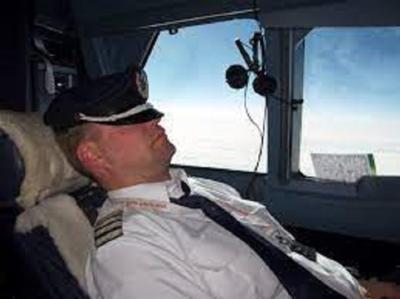Worrying Incidence of Cockpit Microsleeps Reported
A newly-released report painted a poor picture of fatigue risk management in European aviation.

Subject report—compiled by the aviation safety management consultancy Baines Simmons and titled A fatigue survey of European Pilots—analyzed the responses of nearly 6,900 European pilots hailing from 31 countries. The report identified not only significant indicators of fatigue ahead of the busy summer travel season, but shortcomings peculiar to the means by which European airlines manage fatigue risks. Airlines under the safety oversight of several countries—in particular Ireland, Malta, Spain, and the UK—stood out as the worst performers across many of the aspects addressed in the report.
Based on data collected in July 2023, the report showed fatigue building up on airline flight-decks ahead of the summer peak air-travel season. Three-out-of-four pilots experienced at least one microsleep whilst operating an aircraft in the past four weeks—and one-in-four pilots reported five-or-more microsleeps. Furthermore, 72.9-percent of pilots reported having rest intervals insufficient to allow full recovery from fatigue between duties. In addition, the report revealed a concerning trend of flight duty extensions, with nearly one-in-five pilots using Commander’s Discretion (CD) to extend flight duties twice-or-more within the past four weeks. Moreover, over sixty-percent of pilots expressed varying degrees of concern pertaining to potential negative consequences were they to refuse to extend a flight duty under CD.
European Cockpit Association (ECA) President Otjan de Bruijn stated: “These are worrying signs and clear indications that fatigue safety risks are not well managed in many European airlines.”
The Baines Simmons report was released only two months after the European Aviation Safety Agency (EASA) warned about the risk of increased aircrew fatigue during the busy summer travel season, called upon airlines to plan for such with sufficient buffers, and prevailed upon air-carriers to refrain from relying on their pilots to systematically extend maximum flight duties. The report’s findings, however, evince an alternate reality.
Mr. de Bruijn added: “This is very concerning, especially, as the results cover a period before and at the very beginning of the peak of summer operations. If these are the results we are seeing already in June and July, fatigue levels in August can have gone only one way—upwards.”
The report showed, also, another, more structural dimension present not only during summer operations: “The data ... demonstrated that there are challenges and inadequacies in the fatigue risk management arrangements of operators across all countries represented and gaps in the oversight provided by regulators.”
The report continued: “There are clear indications of improvement being required, and a lack of standardization across European states.”

Fatigue reporting serves as an example of a failure to effectively implement fatigue risk management.
To wit: Only 10.8-percent of pilots indicated fatigue reports had led their airline to make operational changes to improve safety; only 13.2-percent selected the survey option stating the company communicates well with crew about fatigue reports; a mere 12-percent stated they trusted their airline’s reporting system.
Baines Simmons observed: “Without an effective reporting system, the airline is unlikely to have an accurate picture of fatigue in the operation, limiting their ability to manage fatigue risk by implementing effective mitigations.”
The survey data indicated airlines registered in Malta, Spain, Ireland, and the UK scored consistently lower on fatigue management, reporting, rest, or use of Commander’s Discretion and fear of refusing it.
ECA Secretary General Philip von Schöppenthau remarked: “Ireland and Malta—two countries with a certain reputation in the aviation industry, and home to major transnationally operating airlines—stand out in this survey but not in the positive way. This raises a number of questions, and it is clearly up to the authorities, as well EASA, to look deeper as to what is going on in those countries and in the airlines under their oversight.”
Mr. von Schöppenthau concluded: “We hope that EASA and national authorities across Europe will take a careful look at the report and take the necessary action to ensure that airlines provide effective fatigue reporting systems and manage properly their fatigue related safety risks.”
 Bolen Gives Congress a Rare Thumbs-Up
Bolen Gives Congress a Rare Thumbs-Up The SportPlane Resource Guide RETURNS!!!!
The SportPlane Resource Guide RETURNS!!!! Buying Sprees Continue: Textron eAviation Takes On Amazilia Aerospace
Buying Sprees Continue: Textron eAviation Takes On Amazilia Aerospace Hawker 4000 Bizjets Gain Nav System, Data Link STC
Hawker 4000 Bizjets Gain Nav System, Data Link STC Echodyne Gets BVLOS Waiver for AiRanger Aircraft
Echodyne Gets BVLOS Waiver for AiRanger Aircraft




